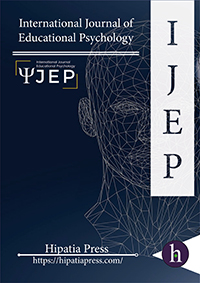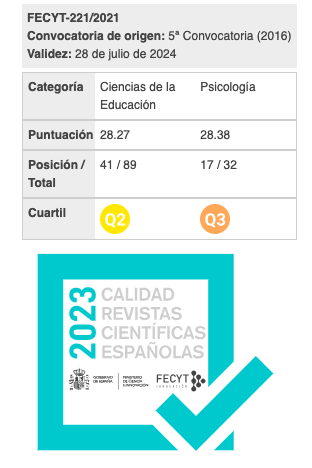Examining the Links between Parents’ Relationships with Reading and Shared Reading with their Pre-School Children
Keywords:
Abstract
While much is known about the benefits of shared reading activity for children, and the role of the home in cultivating shared reading practices far less is known about the factors that can influence parents’ shared reading practices with their children. Given that many young people leave school with poor relationships with reading, this study explores the links between parents’ own relationships with reading and the shared reading they practice with their own children in the home. Drawing on deep-level interview data, this paper presents data from six parents of pre-school children, who reported that they have had a poor personal relationship with reading. These parents all developed positive shared reading relationships with their children, however the importance of this study lies in understanding the interplay between these reading relationships. The data strongly suggested that the construct of ‘reading’ was very different from the ways in which reading had previously been defined for these participants. Reading, within a shared reading context, was seen as a very flexible construct which included activities such as talking and telling stories. In some cases, parents’ own relationships with reading seemed to improve. Implications for intervention with other families are discussed.
Downloads
References
Alvermann, D.E. (2001). Reading adolescents’ reading identities: Looking back to see ahead. Journal of Adolescent & Adult Literacy, 44(8), 676–690
Google Scholar CrossrefAnderson, J., Anderson, A., Friedrich, N., & Kim, J. (2010). Taking stock of family literacy: Some contemporary perspectives. Journal of Early Childhood Literacy, 10, 33–53
Google Scholar CrossrefBarton, D. & Hamilton, M. (1998). Local literacies: reading and writing in one community, London: Routledge.
Google Scholar CrossrefBennett, K. K., Weigel, D. J., & Martin, S. S. (2002). Children’s acquisition of early literacy skills: Examining family contributions. Early Childhood Research Quarterly, 17, 295–317.
Google Scholar CrossrefBus A.G., Van Ijzendoorn, M., & Pellegrini A. D. (1995) Joint Book Reading Makes for Success in Learning to Read: A meta-analysis on intergenerational transmission of literacy. Review Of Educational Research, 65, 1-21.
Google Scholar CrossrefCameron, A. C., & Gillen, J. (2013) ‘Co-constructing family identities through young children’s telephone-mediated narrative exchanges’, First language, 33(3) 246 –267
Google Scholar CrossrefChandler, K. (1999) ‘Reading relationships: Parents, adolescents and popular fiction by Stephen King’, Journal of Adolescent and Adult Literacy, 43(3) 228 – 239
Google Scholar CrossrefClandinin, D. J., & Connelly, F. M. (2000). Narrative inquiry: Experience and story in qualitative research (1st ed.). San Francisco, Calif: Jossey-Bass Inc
Google Scholar CrossrefClark, H., & Hawkins, L. (2010) Young People’s Reading: The Importance of the home environment and family support, London, National Literacy Trust
Google Scholar CrossrefCline, K., & Edwards, C. P. (2013) The Instructional and Emotional Quality of Parent-Child Book Reading and Early Head Start Children's Learning Outcomes. Early Educ. Dev., 24, 1214-1231.
Google Scholar CrossrefGjems, L. (2010). Teachers talking to young children: Invitations to negotiate meaning in everyday conversations. European Early Childhood Education Research Journal, 18(2), 139–148.
Google Scholar CrossrefGreenleaf C. L., & Hinchman, K. (2009) ‘Reimagining our inexperienced adolescent readers: from struggling, striving, marginalised, and reluctant to thriving’, Journal of Adolescent and Adult literacy, 10, 4 - 13
Google Scholar CrossrefGregory, E., Long, S., & Volk, D. (2004) (eds.) Many Pathways to Literacy: Young Children Learning with Siblings, Grandparents, Peers, and Communities. New York: Routledge Falmer.
Google Scholar CrossrefHall, L. A. (2016) The Role of Identity in Reading Comprehension Development, Reading & Writing Quarterly, 32:1, 56-80, DOI: 10.1080/10573569.2013.861332
Google Scholar CrossrefHarris, K.K., Loyo, J.J., Holahan, C.K., Suzuki, R., & Gottlieb, N.H., 2007. Cross-sectional predictors of reading to young children among participants in the Texas WIC program. Journal of Research in Childhood Education, 21(3), pp.254-268.
Google Scholar CrossrefHeath, S. B. (1983). Ways with Words: Language, Life and Work in Communities and Classroom, Cambridge: Cambridge University Press
Google Scholar CrossrefJames, A., & Curtis, P. (2010) Family Displays and Personal Lives. Sociology 44(6): 1–18.
Google Scholar CrossrefJustice, L. M., Logan, J. R., & Damschroder, L. (2015) ‘Designing caregiver-implemented shared-reading interventions to overcome implementation barriers’, Journal of Speech and Language and Hearing Research, vol 58(6), pS1851 – S1863
Google Scholar CrossrefJustice, L. M., Skibbe, L. E., McGinty, A. S., Piasta, S. B., & Petrill, S. (2011). Feasibility, efficacy, and social validity of home-based storybook reading intervention for children with language impairment. Journal of Speech, Language, and Hearing Research, 54, 523–538.
Google Scholar CrossrefLevy, R. (2008) ‘Third spaces’ are interesting places; applying ‘third space theory’ to nursery-aged children’s constructions of themselves as readers’, Journal of Early Childhood Literacy, 8(1), 43–66
Google Scholar CrossrefLevy, R. (2009) ‘Children’s perceptions of reading and the use of reading scheme texts’, Cambridge Journal of Education, 39(3), 361 - 377
Google Scholar CrossrefLin, J., Reich, S.M., Kataoka, S., & Farkas, G., 2015. Maternal Reading Self-Efficacy Associated with Perceived Barriers to Reading. Child Development Research, 2015.
Google Scholar CrossrefLonigan, C. J., & Whitehurst, G. J. (1998). Relative efficacy of parent and teacher involvement in a shared-reading intervention for preschool children from low-income backgrounds. Early Childhood Research Quarterly, 13, 263–290.
Google Scholar CrossrefLove, K., & Hamston, J. (2004), Committed and reluctant male teenage readers: Beyond bedtime stories. Journal of Literacy Research, 36(3), 335-400
Google Scholar CrossrefManz, P.H., Hughes, C., Barnabas, E., Bracaliello, C., & Ginsburg-Block, M., 2010. A descriptive review and meta-analysis of family-based emergent literacy interventions: To what extent is the research applicable to low-income, ethnic-minority or linguistically-diverse young children?. Early Childhood Research Quarterly, 25(4), pp.409-431.
Google Scholar CrossrefMinns, H. (1997) Read it to me now!: Learning at home and at school, Buckingham, Open University Press
Google Scholar CrossrefMol, S., Bus A. G., De Jong, M., & Smeets, D. (2008) Added value of dialogic parent-child
Google Scholar Crossrefbook readings: A meta-analysis. Early Education and Development 19, pp.7-26.
Google Scholar CrossrefMullan, K. (2010) ‘Families that read: A time-diary analysis of young people’s and parents’ reading’, Journal of Research in Reading, 33(4) 414 - 430
Google Scholar CrossrefOwoki, G. (2001). Make way for literacy: Teaching the way young children learn. Washington, DC: National Association for the Education of Young Children.
Google Scholar CrossrefPahl, K. (2002) 'Habitus and the home: texts and practices in families’, Ways of Knowing Journal, 2(1), 45-53
Google Scholar CrossrefPerregaard, B. (2010). ‘Luckily it was only for 10 minutes’: Ideology, discursive positions and language socialization in family interaction. Journal of Sociolinguistics, 14, 370–398. doi: 10.1111/J.1467-9841.2010.00444.x
Google Scholar CrossrefReese, E., & Cox, A. (1999) Quality of adult book reading affects children's emergent literacy. Developmental Psychology, 35, 20-28.
Google Scholar CrossrefSmart, C. (2007) Personal Life. Cambridge: Polity
Google Scholar CrossrefSnow, C. (1994) Enhancing Literacy Development: Programs and research perspectives.
Google Scholar CrossrefIn Dickinson DK (Ed) Bridges to Literacy. Oxford, Blackwell.
Google Scholar CrossrefSnow, C. E. (2000). On language and literacy development. Early Childhood Today, 15(2), 46.
Google Scholar CrossrefVandermaas-Peeler, M., Sassine, B., Price, C., & Brilhart, C. (2011). Mothers ‘and fathers’ guidance behaviours during storybook reading. Journal of Early Childhood Literacy, 12, 415–442.
Google Scholar CrossrefWanzek, J., Wexler, J., Vaughn, S., & Ciullo, S. (2010) ‘Reading interventions for struggling readers: a synthesis of 20 years of research’, Reading and Writing, 23, 889 - 912
Google Scholar CrossrefPublished
Almetric
Dimensions
How to Cite
Issue
Section
License
All articles are published under Creative Commons copyright (CC BY). Authors hold the copyright and retain publishing rights without restrictions, but authors allow anyone to download, reuse, reprint, modify, distribute, and/or copy articles as the original source is cited.
















